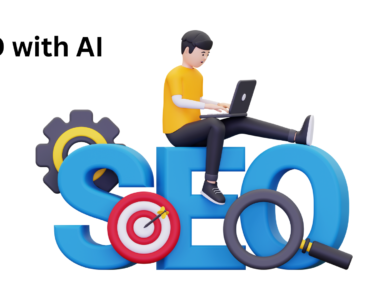In today’s digital world, a strong online presence is essential for any business aiming to succeed. A digital marketing agency specializes in enhancing that online presence through a variety of strategies and techniques. These agencies have evolved to become key players in helping businesses navigate the complexities of digital marketing, offering expertise and tools that drive success in a competitive marketplace.
Services Offered by Digital Marketing Agencies
- Search Engine Optimization (SEO)
SEO involves optimizing your website to rank higher in search engine results. Digital Marketing Agency focus on both on-page and off-page SEO to improve your site’s visibility and attract organic traffic. - Content Marketing
Content marketing is all about creating and distributing valuable content to attract and engage your target audience. This includes blog posts, articles, infographics, and videos designed to provide value and establish authority. - Social Media Marketing (SMM)
Social Media Marketing involves leveraging platforms like Facebook, Twitter, and Instagram to connect with your audience, build brand awareness, and drive engagement. - Pay-Per-Click Advertising (PPC)
PPC advertising allows you to place ads on search engines and social media platforms. You pay each time someone clicks on your ad, which drives targeted traffic to your website. - Email Marketing
Email marketing involves sending targeted messages to your audience to build relationships, promote products, and drive conversions. It’s a powerful tool for nurturing leads and retaining customers. - Web Design and Development
Web design and development services ensure your website is visually appealing, functional, and optimized for user experience. This includes everything from design and layout to coding and maintenance. - Analytics and Reporting
Analytics and reporting provide insights into your marketing performance. Agencies track key metrics, analyze data, and generate reports to help you understand your ROI and make informed decisions.
Benefits of Working with a Digital Marketing Agency
- Expertise and Experience
Digital marketing agencies bring a wealth of expertise and experience to the table. Their knowledge of industry best practices and trends helps ensure your marketing strategies are effective and up-to-date. - Access to Advanced Tools
Agencies have access to advanced marketing tools and technologies that might be too costly or complex for individual businesses. These tools help optimize campaigns and track performance. - Comprehensive Strategy Development
A well-rounded strategy is crucial for success. Agencies develop comprehensive marketing plans that integrate various tactics, ensuring a cohesive approach to reaching your goals. - Scalability and Flexibility
Digital marketing agencies offer scalability and flexibility, adapting their services to meet your changing needs. Whether you’re launching a new product or expanding into new markets, agencies can adjust strategies accordingly.
Choosing the Right Digital Marketing Agency
- Assessing Agency Expertise
Look for agencies with proven expertise in your industry or niche. Their experience should align with your specific marketing needs and goals. - Reviewing Portfolios and Case Studies
A strong portfolio and case studies showcase the agency’s ability to deliver results. Review their past work to assess their effectiveness and creativity. - Evaluating Client Testimonials
Client testimonials provide insight into the agency’s reliability and customer satisfaction. Positive feedback indicates a successful track record and good client relationships. - Understanding Pricing Models
Different agencies offer various pricing models, such as project-based, retainer-based, or performance-based pricing. Choose a model that aligns with your budget and objectives. - Setting Clear Goals and Expectations
Clearly define your goals and expectations before engaging with an agency. This ensures that both parties are aligned and working towards the same objectives.
The Digital Marketing Strategy Process
- Initial Consultation and Discovery
The process begins with an initial consultation where the agency learns about your business, goals, and challenges. This discovery phase is crucial for developing a tailored strategy. - Strategy Development
Based on the consultation, the agency develops a comprehensive digital marketing strategy. This includes defining objectives, selecting tactics, and creating a roadmap for implementation. - Implementation and Execution
Once the strategy is approved, the agency implements and executes the marketing plan. This involves launching campaigns, creating content, and managing various marketing channels. - Monitoring and Optimization
Agencies continuously monitor campaign performance and make adjustments as needed. Optimization ensures that strategies remain effective and goals are met. - Reporting and Analysis
Regular reporting and analysis provide insights into the success of your marketing efforts. Agencies generate detailed reports that highlight key metrics and offer recommendations for improvement.
Search Engine Optimization (SEO): Enhancing Online Visibility
- On-page SEO involves optimizing individual web pages to rank higher and attract more relevant traffic. This includes keyword optimization, meta tags, and internal linking.
- Off-page SEO focuses on external factors that impact your rankings, such as backlinks and social signals. Building high-quality backlinks from reputable sites enhances your site’s authority.
- Technical SEO ensures that your website’s technical aspects are optimized for search engines. This includes improving site speed, mobile responsiveness, and site architecture.
Content Marketing: Creating Valuable Content
- Content Strategy
A solid content strategy outlines your goals, target audience, and content types. It guides the creation and distribution of content to achieve your marketing objectives. - Types of Content
Content can take various forms, including blog posts, videos, infographics, and eBooks. Choose content types that resonate with your audience and support your goals. - Content Distribution
Effective content distribution ensures that your content reaches your target audience. This includes sharing content on social media, email newsletters, and other channels.
Social Media Marketing (SMM): Engaging Your Audience
- Platform Selection
Choosing the right social media platforms is crucial for reaching your audience. Focus on platforms where your target demographic is most active. - Content Creation and Scheduling
Create engaging content that aligns with your brand and resonates with your audience. Use scheduling tools to plan and automate your social media posts. - Engagement and Interaction
Engage with your audience by responding to comments, messages, and feedback. Active interaction builds relationships and enhances brand loyalty.
Pay-Per-Click Advertising (PPC): Driving Targeted Traffic
- Ad Campaign Creation
Create compelling PPC ads that attract clicks and drive traffic to your website. Focus on clear messaging and strong calls-to-action. - Keyword Research and Bidding
Conduct keyword research to identify terms your audience is searching for. Use this information to set bids and target relevant keywords in your ads. - Performance Tracking and Optimization
Monitor PPC campaign performance and adjust bids, keywords, and ad copy based on results. Continuous optimization improves ad effectiveness and ROI.
Email Marketing: Building Relationships
- Email List Building
Build a high-quality email list by capturing leads through sign-up forms, landing pages, and other strategies. A targeted list ensures your messages reach interested recipients. - Crafting Effective Emails
Create effective emails with compelling subject lines, valuable content, and clear calls-to-action. Personalization and segmentation improve engagement and conversion rates. - Measuring Email Campaign Success
Track email campaign metrics such as open rates, click-through rates, and conversions. Use this data to refine your email marketing strategy and achieve better results.
Web Design and Development: Your Digital Storefront
- Website Design Best Practices
Follow website design best practices to create a visually appealing and user-friendly site. Focus on layout, color schemes, and typography that align with your brand. - User Experience (UX) Design
UX design ensures that your website is easy to navigate and provides a positive experience for users. Prioritize intuitive navigation, fast load times, and mobile responsiveness. - Mobile Responsiveness
Ensure that your website is mobile-responsive, meaning it adjusts to different screen sizes and devices. A mobile-friendly site improves user experience and search engine rankings.
Analytics and Reporting: Measuring Success
- Key Performance Indicators (KPIs)
Identify and track KPIs to measure the success of your digital marketing efforts. Common KPIs include website traffic, conversion rates, and return on investment (ROI). - Data Analysis Techniques
Use data analysis techniques to interpret marketing metrics and identify trends. This helps you understand performance and make data-driven decisions. - Creating Actionable Insights
Transform data into actionable insights that inform your marketing strategy. Use these insights to make improvements and achieve better results.
Case Studies: Success Stories from Digital Marketing Agencies
- Examples of Effective Campaigns
Explore case studies showcasing successful digital marketing campaigns. These examples illustrate how agencies have achieved remarkable results for their clients. - Lessons Learned
Analyze lessons learned from successful projects to gain insights into effective strategies and tactics. Apply these lessons to enhance your own digital marketing efforts.
Common Misconceptions About Digital Marketing Agencies
- Debunking Myths
Address common misconceptions about digital marketing agencies, such as the belief that they are only for large businesses or that results are guaranteed. - Understanding the Realities
Understand the realities of working with digital marketing agencies, including the importance of clear communication, realistic expectations, and ongoing collaboration.
Conclusion
Partnering with a digital marketing agency can significantly enhance your online presence and drive business success. With their expertise, advanced tools, and comprehensive strategies, agencies help businesses navigate the complexities of digital marketing and achieve their goals. By carefully selecting the right agency and understanding their services, you can leverage their knowledge to stay ahead in the digital landscape.
FAQs
- What should I look for in a digital marketing agency?
Look for agencies with expertise in your industry, a strong portfolio, positive client testimonials, and transparent pricing. Ensure they offer services aligned with your marketing goals. - How much do digital marketing agencies charge?
Pricing varies based on the agency’s experience, services provided, and the scope of your project. Agencies may offer project-based, retainer-based, or performance-based pricing models. - How long does it take to see results from digital marketing?
The timeline for seeing results depends on various factors, including the type of marketing strategies used and your industry. Generally, it takes a few months to start seeing significant results. - Can I handle digital marketing on my own?
While it’s possible to manage digital marketing in-house, partnering with an agency provides access to specialized expertise, advanced tools, and a comprehensive strategy that can yield better results. - What is the difference between digital marketing and traditional marketing?
Digital marketing focuses on online channels such as search engines, social media, and email, while traditional marketing includes offline methods like print ads, TV commercials, and direct mail. Digital marketing offers more precise targeting and measurable results.




